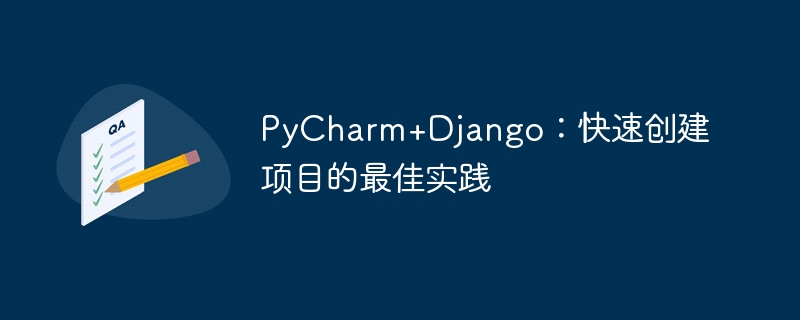Home >Backend Development >Python Tutorial >PyCharm+Django: Best practices for quickly creating projects
PyCharm+Django: Best practices for quickly creating projects
- WBOYWBOYWBOYWBOYWBOYWBOYWBOYWBOYWBOYWBOYWBOYWBOYWBOriginal
- 2024-02-20 09:09:36670browse

PyCharm Django: Best Practices for Quickly Creating Projects
Introduction:
With the rapid development of the Internet, web application development has become more and more popular . As an advanced web framework under the Python language, Django is simple, efficient, and easy to use, making it the first choice for developers. As a powerful Python development environment, PyCharm can help developers create and develop Django projects more quickly through its rich functions and friendly user interface. This article will introduce the best practices for quickly creating projects using PyCharm and Django, and provide specific code examples.
1. Install and configure PyCharm
First, you need to download and install PyCharm. You can find the version suitable for your operating system on the JetBrains official website and follow the installation wizard to install it.
After the installation is complete, open PyCharm and make the necessary configurations. For example, configure the Python interpreter, set code style, import code style configuration, etc. These configurations can help you develop better.
2. Create a Django project
Creating a Django project in PyCharm is very simple. Follow the steps below:
- Open PyCharm and click the "Create New Project" button in the upper right corner.
- In the pop-up New Project dialog box, select the "Django" project type and specify a name and location for the project.
- In the next step, some project configuration can be done. For example, specify the version of Django, choose the virtual environment to use, etc.
- After completing the configuration, click the "Create" button, and PyCharm will automatically create the infrastructure of the Django project for you.
3. Configure the Django project
- Configure the database: In PyCharm, you can easily configure the database used by the Django project. Click the "Database" tab on the left, and then click the " " button in the upper right corner to add a database connection. Select the appropriate database type and fill in the connection information.
- Configure Django running parameters: In PyCharm, you can directly configure the running parameters of the Django project. Click the "Edit Configurations" button in the upper right corner, select "Django server", and then configure it accordingly.
4. Writing Django views and models
In PyCharm, you can write Django views and models very conveniently.
- Writing views: In Django projects, views act as controllers, responsible for processing requests and returning corresponding responses. In PyCharm, you can use functions such as code auto-completion, code navigation, and code refactoring to improve development efficiency. The following is a simple sample code:
from django.http import HttpResponse
def hello(request):
return HttpResponse("Hello, World!")- Writing models: In Django projects, models are used to define data structures and database tables, which can be done using Django's ORM (Object Relational Mapping) Database operations. In PyCharm, you can use Django's model tools and code hints to write models. The following is a simple sample code:
from django.db import models
class User(models.Model):
name = models.CharField(max_length=50)
age = models.IntegerField()5. Run and debug Django projects
In PyCharm, you can run and debug Django projects directly.
- Run the project: Click the green run button on the toolbar, or use the shortcut key Shift F10 to run the Django project. PyCharm will automatically start the Django server and open the browser to display your website.
- Debug the project: Click the bug button on the toolbar, or use the shortcut key Shift F9 to enter debugging mode. You can set breakpoints in your code to debug your code.
6. Deploying Django projects
In PyCharm, you can deploy Django projects very conveniently.
- Configure deployment: Click the "Deploy" button on the toolbar to perform deployment configuration. You can select the type of server to deploy to, fill in the server connection information, etc.
- Execute deployment: Click the "Deploy" button on the toolbar, or use the shortcut key Ctrl F10 to execute deployment. PyCharm will automatically deploy your project to the specified server.
Conclusion:
This article introduces the best practices for quickly creating projects using PyCharm and Django, and provides specific code examples. Through the powerful functions of PyCharm and the convenience of Django, you will be able to develop and deploy Django projects more efficiently. I hope this article can help you, and wish you success in developing Django projects!
The above is the detailed content of PyCharm+Django: Best practices for quickly creating projects. For more information, please follow other related articles on the PHP Chinese website!

